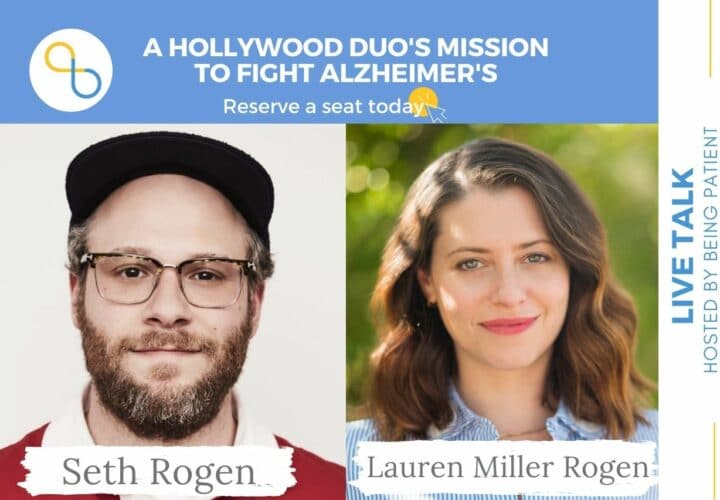Hollywood power couple Seth Rogen and his wife Lauren Miller Rogen are raising awareness about Alzheimer’s through comedy. On a more serious note, their goal is an urgent one: “to help people, today.” Being Patient sat down with the couple to talk about how Alzheimer’s has touched their personal lives — and about their mission.
Less than a year after Seth Rogen and his now wife, Lauren Miller Rogen started dating, Lauren’s mother was diagnosed with early-onset Alzheimer’s. Since then, the two have used their influence to raise awareness and combat stigma. But, being comedic actors — Rogen is best known for The Interview, Pineapple Express, Knocked Up and others; Miller Rogen boasts a number of acting credits as well as writing and directing — they have taken a somewhat unconventional approach.
In 2012, the couple founded national non-profit organization Hilarity for Charity, now known as HFC. The goal: to raise awareness about Alzheimer’s disease, create accessible brain health education tools, provide home care for people who can’t afford it and invest in prevention research. Through their organization, the couple hosts signature events like the Brain Health Dinner Series, comedy-filled carnivals, and they even have a comedy special on Netflix featuring comedians like Sacha Baron Cohen, Tiffany Haddish and Michael Che.
Rogen jokes that when the couples’ careers as high-fashion models dried up some years back, they were forced into “more intellectual pursuits.” But the truth is that for both of them, and especially for Miller Rogen, this venture is personal. She lost her mother in February 2020, fifteen years after her initial diagnosis of early-onset Alzheimer’s. Before that, she watched her maternal grandparents contend with the neurodegenerative disease. “I don’t remember a time where I haven’t had a loved one with Alzheimer’s,” she reflected.
While the disease is not prevalent in Rogen’s family, witnessing the often bleak reality of Alzheimer’s through his in-laws has been an eye-opening experience. And while they use comedy as an escape from the darkest moments, they know first-hand that Alzheimer’s is no laughing matter. They have both experienced the toll that caregiving takes, personally and on Miller Rogen’s father and brother. “With Lauren’s mother, it went very dark very fast,” Rogen told Being Patient. “It was devoid of humor in every way shape or form.”
Focusing On the Things You Can Control
Despite her familial links to the disease, Miller Rogen is vocal about focusing on what she can control, instead of what she can’t. According to the couple, they spend “an inordinate amount of time” talking about brain health and adopting lifestyles habits to benefit their cognition. In their recent Being Patient LiveTalk, they jointly referred to recent findings that 40 percent of dementia cases can be prevented or delayed by targeting 12 risk factors throughout life.
Miller Rogen believes the easiest thing you can do to take care of your brain is to develop better sleeping habits. She recommends going to sleep and waking up at the same time (preferably both on the earlier side), keeping the room cool, wearing blue light glasses before bed, a sleep mask and using a sleep tracker.
Beyond that, some of their other key focuses for better brain health are exercise, learning new things, and maintaining a nutritious diet — they are incredibly conscious of their alcohol and sugar consumption, even swearing off some high-sugar fruits.
“What smoking is for your lungs and what fat is for your heart, sugar is for your brain. If you never had any sugar again for the rest of your life, you’d be much happier,” Rogen said. “It’s a real bummer, but that’s the truth.”
Miller Rogen said she also encourages people not to fear the information garnered from genetic testing, for example, but instead use it to take a proactive approach: “You don’t have to be afraid of these tests. If you have the information, you can take action,” she told Being Patient. “Your genes may be the roadmap, but they don’t have to be your destiny. So much can be done for prevention and to alter your risk.”
The couple offers an important reminder that looking out for one’s cognitive health isn’t all just self-discipline and sacrifices; it can be fun, too: Their latest undertaking? Pottery. They have created a shop’s worth of ceramic goods, taking virtual glaze making workshops from home, which Rogen said “is like learning insane chemistry.”
One Obstacle to Alzheimer’s Awareness: It’s ‘A Real Bummer’
Beyond what the pair do in hopes of defending their own brains from cognitive decline, they are constantly leveraging HFC to help others, too. But one of the biggest obstacles they’ve encountered in driving awareness, Rogen explained, is simple: People don’t like to talk about brain health.
“It seems there are few things that make people more uncomfortable than speaking about brain health in general,” Rogen said. “Weirdly, of all the things I talk about, [it’s the] the most taboo and the thing that makes people the most uncomfortable. And I made a movie where food has sex with each other. That speaks to how taboo brain health is.”
A perfect example of this is demonstrated in the couple’s inability to get distribution for an Alzheimer’s documentary, despite Rogen’s deeply rooted Hollywood ties.
“We made a documentary called This Is Alzheimer’s, and we can’t get the distribution for it because it’s a real bummer,” Miller Rogen said. “It’s something that people want to lock away and not confront themselves with it until they’re forced to.”
Miller Rogen thinks that the more we can confront reality and our own mortalities, the better off our society will be in dealing with tough diagnoses like Alzheimer’s.
“We just have to keep talking about Alzheimer’s,” she urged. “The more families, caregivers and people with Alzheimer’s talk about it, the more we can destigmatize it.”
Making an Impact With HFC
Miller Rogen acknowledged that her family was fortunate to have the resources to provide care for her mother. But for many families, this isn’t the case. Accordingly, one of the key missions of HFC is to support caregivers who are not as fiscally fortunate.
In the past nine years, the organization has raised over $13 million dollars for Alzheimer’s thus far, and awarded over 300,000 hours of in-home care relief to Alzheimer’s family caregivers in addition to hosting virtual support groups, an accessible method they used long before the pandemic pushed more people to convene online.
The charity’s driving force will continue to be teaching people how to care for the health of their brains today, so they can reduce their risk tomorrow.
“HFC gives me hope,” Miller Rogen said. “It’s an outlet for where I have positivity and optimism. It’s been such a blessing to make any sort of impact in it.”
“It’s been a fascinating journey,” Rogen added. “A sad journey, but ultimately, in some ways, a hopeful journey.”
Contact Genevieve Glass at genevieve@beingpatient.com





